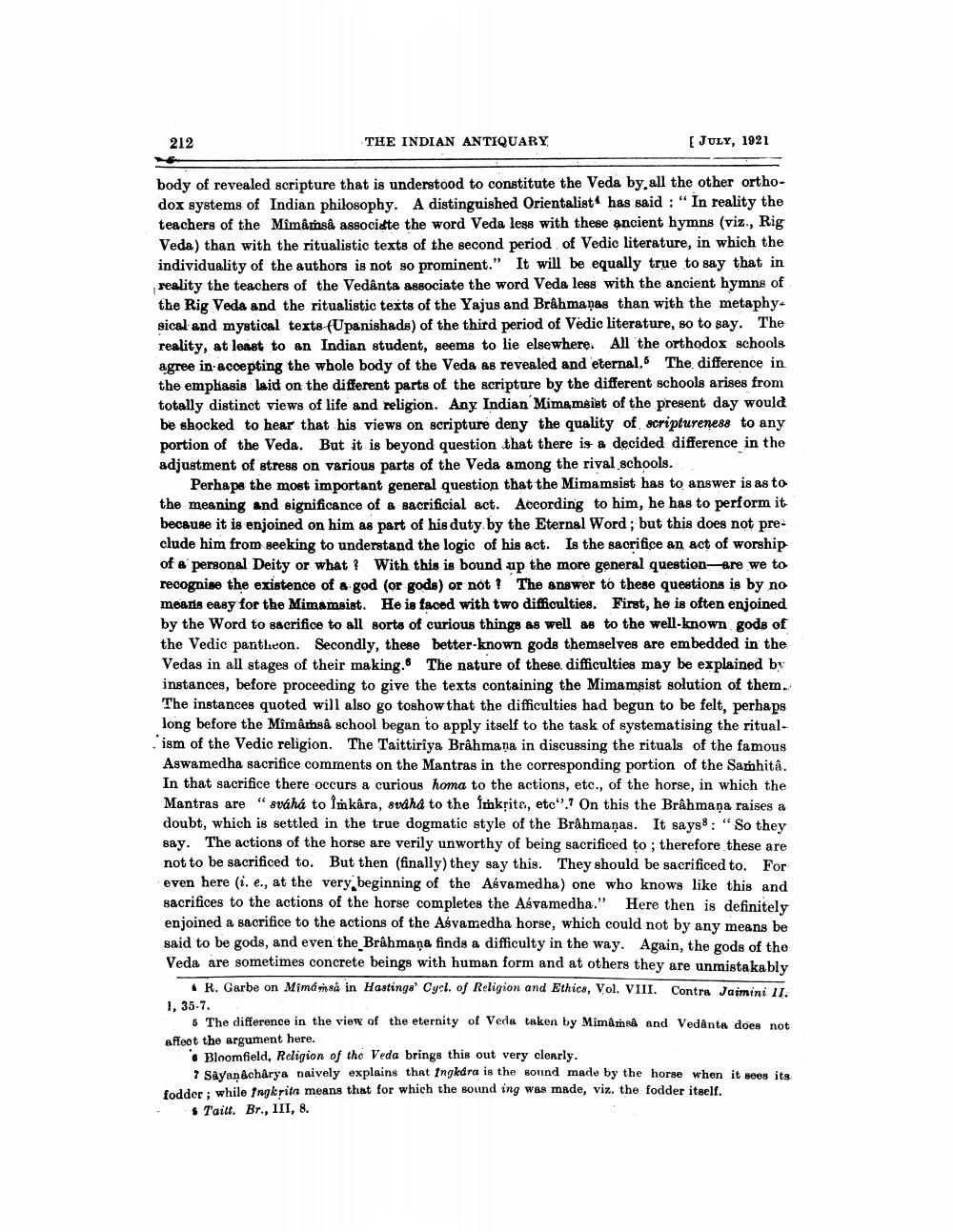________________
212
THE INDIAN ANTIQUARY
[ JULY, 1921
body of revealed scripture that is understood to constitute the Veda by all the other orthodox systems of Indian philosophy. A distinguished Orientalist has said : "In reality the teachers of the Mimâmså associate the word Veda legs with these ancient hymns (viz., Rig Veda) than with the ritualistic texts of the second period of Vedic literature, in which the individuality of the authors is not so prominent." It will be equally true to say that in reality the teachers of the Vedânta associate the word Veda less with the ancient hymns of the Rig Veda and the ritualistic texts of the Yajus and Brâhmaņas than with the metaphy. sical and mystical texts (Upanishads) of the third period of Vedic literature, so to say. The reality, at least to an Indian student, seems to lie elsewhere. All the orthodox schools agree in accepting the whole body of the Veda as revealed and eternal. The difference in the emphasis laid on the different parts of the scripture by the different schools arises from totally distinct views of life and religion. Any Indian Mimamsist of the present day would be shocked to hear that his views on scripture deny the quality of scriptureness to any portion of the Veda. But it is beyond question that there is a decided difference in the adjustment of stress on various parts of the Veda among the rival schools.
Perhaps the most important general question that the Mimamsist has to answer is as to the meaning and significance of a sacrificial act. According to him, he has to perform it because it is enjoined on him as part of his duty by the Eternal Word; but this does not preclude him from geeking to understand the logic of his act. Is the sacrifice an act of worship of a personal Deity or what? With this is bound up the more general question-are we to recognise the existence of a god (or gods) or not? The answer to these questions is by no means easy for the Mimamsist. He is faced with two difficulties. First, he is often enjoined by the Word to sacrifice to all sorts of curious things as well as to the well-known gods of the Vedic pantheon. Secondly, these better known gods themselves are embedded in the Vedas in all stages of their making. The nature of these difficulties may be explained by instances, before proceeding to give the texts containing the Mimamsist solution of them. The instances quoted will also go toshow that the difficulties had begun to be felt, perhaps long before the Mîmarså school began to apply itself to the task of systematising the ritualism of the Vedio religion. The Taittiriya Brahmana in discussing the rituals of the famous Aswamedha sacrifice comments on the Mantras in the corresponding portion of the Samhita. In that sacrifice there occurs a curious homa to the actions, etc., of the horse, in which the Mantras are "sváhá to imkâra, svdha to the Imkrits, etc. On this the Brâh mana raises a doubt, which is settled in the true dogmatic style of the Brahmaņas. It says8: "So they say. The actions of the horse are verily unworthy of being sacrificed to; therefore these are not to be sacrificed to. But then (finally) they say this. They should be sacrificed to. For even here (i. e., at the very beginning of the Aévamedha) one who knows like this and sacrifices to the actions of the horse completes the Asvamedha." Here then is definitely enjoined a sacrifice to the actions of the Asvamedha horse, which could not by any means be said to be gods, and even the Brâhmaņa finds a difficulty in the way. Again, the gods of the Veda are sometimes concrete beings with human form and at others they are unmistakably
R. Garbe on Mimamsa in Hastings' Cycl. of Religion and Ethics, Vol. VIII. Contra Jaimini 11. 1, 35.7.
5 The difference in the view of the eternity of Veda taken by Mimams and Vedanta does not affect the argument here.
Bloomfield, Religion of the Veda brings this out very clearly.
7 Sayanacharya naively explains that ingkára is the sound made by the horse when it goes its fodder : while Ingkrita means that for which the sound ing was made, viz. the fodder itself.
Taitt. Br., III, 8.




